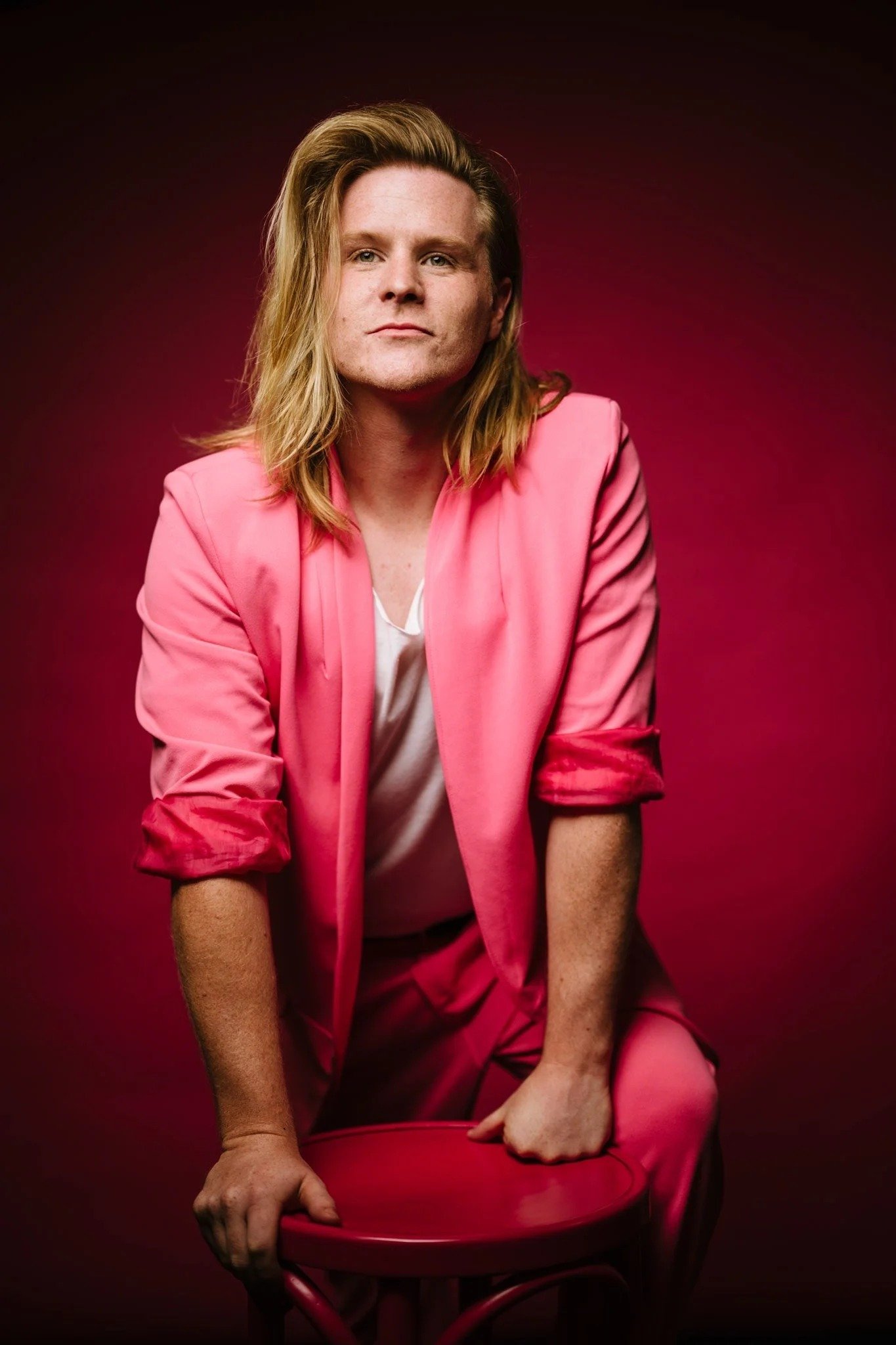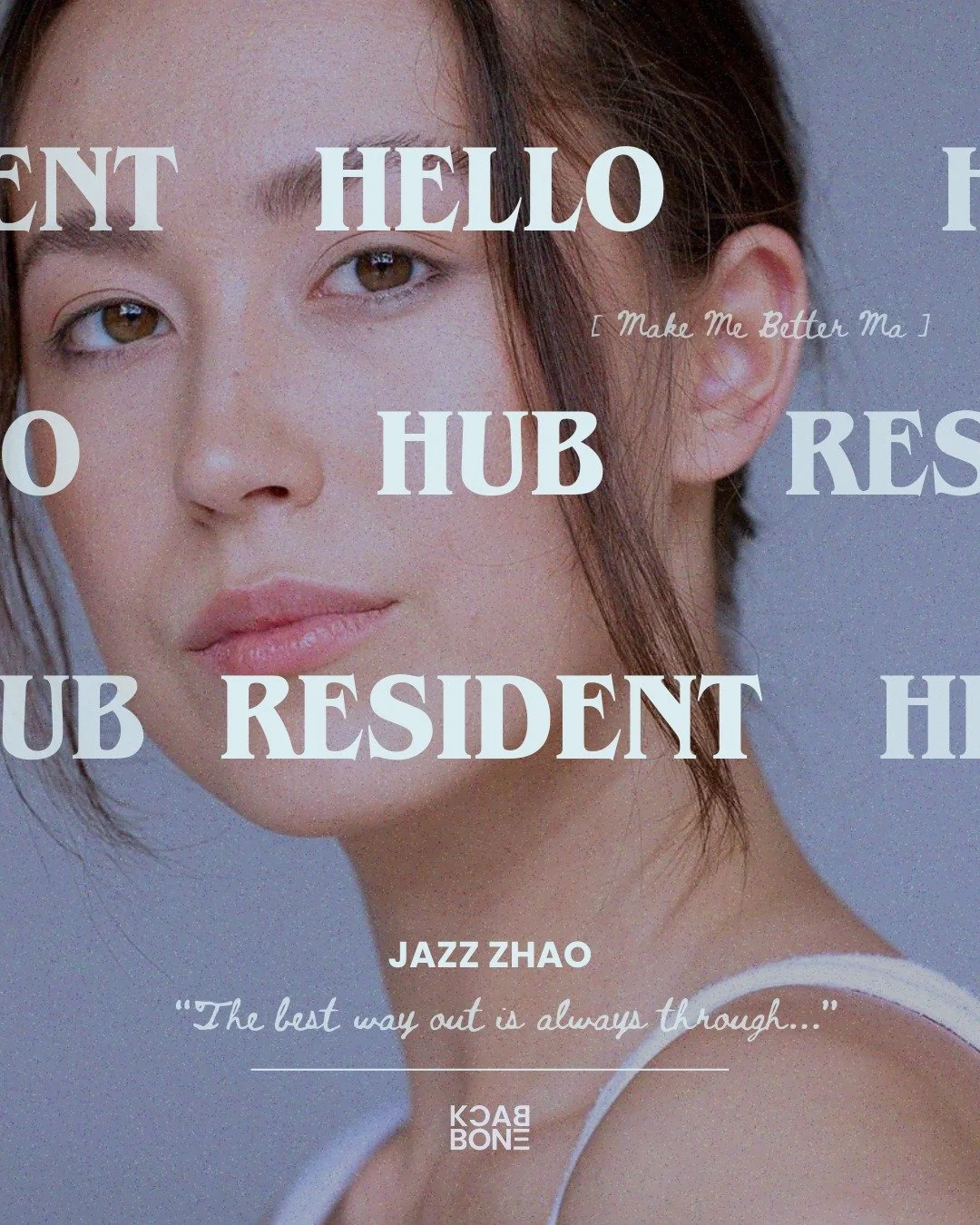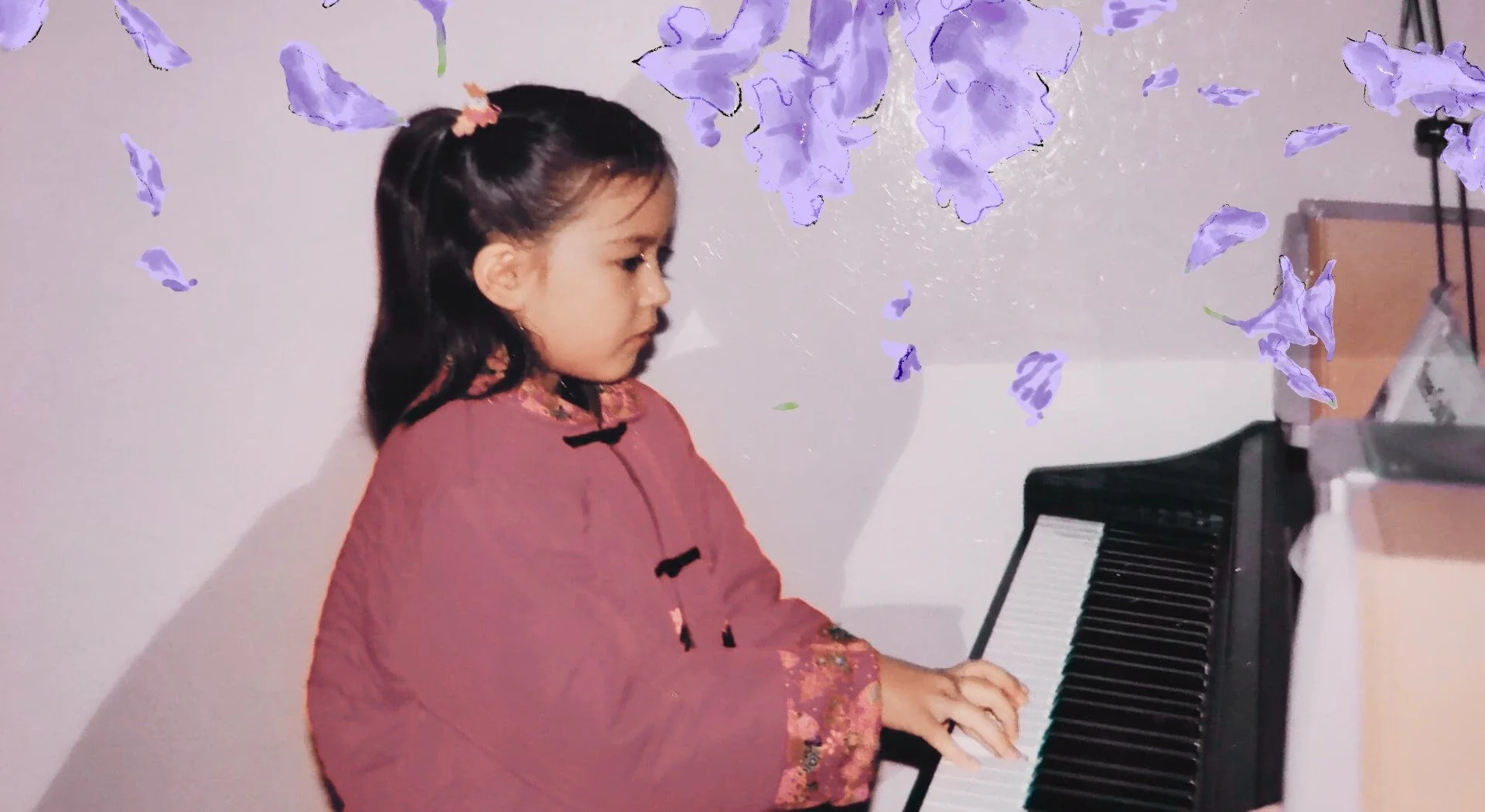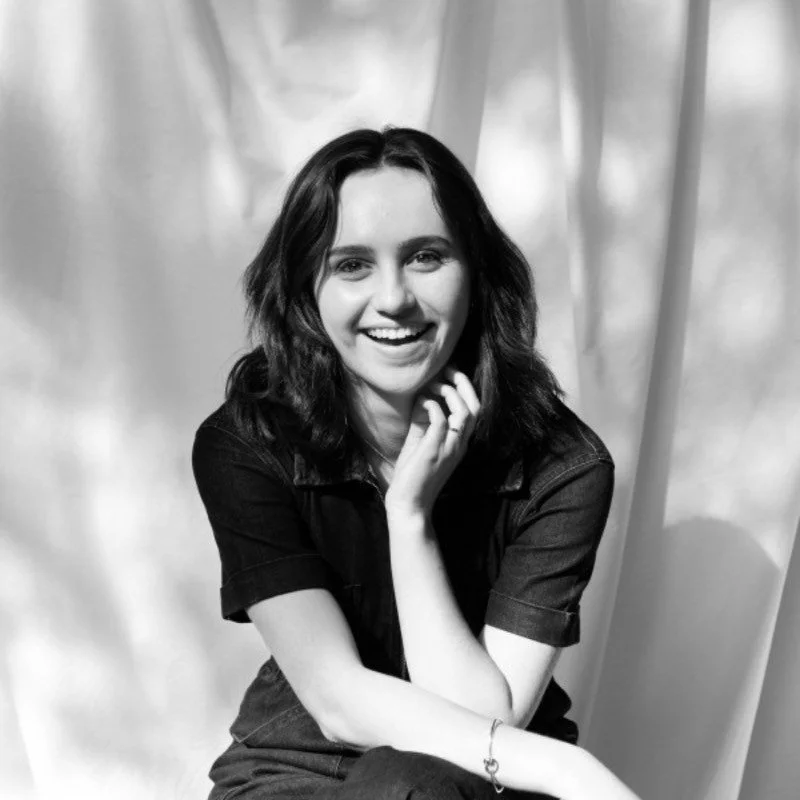LOOK UP, it’s the 2025 Backbone Youth Arts Festival
Hero Image for ‘LOOK UP’ provided by Backbone
“This October, LOOK UP – from the ground, from the scroll, from the noise – and look toward what the next generation of art-makers has to offer“. (extract ArtsHub)
Backbone Youth Arts is a community organisation dedicated to amplifying the voices, the works of emerging artists through connection, creativity and community. One of it’s key activities to achieve this is the annual Backbone Festival.
Across three weeks, this year’s festival, LOOK UP, will uplift the next generation of bold makers across performance, sound, visual art, and experiences that will challenge expectations.
NEHIB spoke to three creatives involved in this year’s festival about what it means to them, including Stephen Quinn, the Executive Director of Backbone, and two members of the creative team of one of this year’s shows, Make Me Better Ma, Jazz Zhao and Chelsea August.
Stephen Quinn. Image from Backbone
EXECUTIVE DIRECTOR: Stephen Quinn | Backbone Youth Arts
Quinn says that this year’s festival theme started with jacarandas when every Spring, Brisbane turns purple.
“Those bright blooms take over the skyline and you can’t help but LOOK UP! That moment of colour and wonder sparked something for us” says Quinn.
Essentially, LOOK UP is about shifting your gaze away from the chaos and noise of the world, and towards what’s just above you, just beyond you, or just out of reach.
“It’s an invitation to notice the magic again - in the sky, in each other, and in the stories we tell,” adds Quinn.
In response to our question about the selection criteria for this year’s festival, Quinn says that the festival is built from the ground up with emerging artists and most of the lineup from Backbone’s HUB Artist-in-Residence program, where young artists spend the year developing new work with his team’s support — free rehearsal space, masterclasses in producing, mentorship and guidance are included.
“We start with EOIs from artists under 30 across South East Queensland. We look for strength, originality, and viability but also for heart. We look for artists who are pushing boundaries, experimenting wildly and saying something that matters. When programming the festival, we make sure there’s a great mix of voices, artforms, and perspectives” explains Quinn.
The result is a vibrant collision of theatre, sound, and visual art that happens across the Seven Hills Hub.
Quinn would like audiences to see firsthand that young artists do have the potential and that they’re already making bold, brilliant work.
“The festival is packed with voices that are sharp, funny, political, and full of heart. Mostly, we hope people walk away reminded that young artists aren’t the future of Australian culture – they’re the now” Quinn adds passionately.
The 2025 festival promises to be a ‘vibrant collection of young voices, bold ideas and untamed creativity’.
WRITER/ACTOR/PRODUCER: Jazz Zhao | Make Me Better Ma
Jazz Zhao. Image from Backbone
According to the program, Make Me Better Ma is thirteen years in the making! NEHIB asked Zhao how she devised this intriguing title and whether it changed over time.
Zhao admits that it is the culmination of a decade of writing in private journals to Milo, an imaginary Ghost Cat. From 13 years old, she began each of her diary entries with ‘Dear Milo’.
“The early formation of Make Me Better Ma began in 2011 – the week my high school got involved with what was happening at home and when the police dropped me off to stay at a friend's place. After I gave her a quick run-down, my friend suggested that I write a book. Soon after I was inspired to begin my own journal when another friend shared her journal collection with me” says Zhao.
The play itself explores the tumultuous years pre-21, before Zhao and her mother began to reconcile their relationship. Choosing to be an actor, Zhao felt compelled to bring the juiciest scenes she had collated throughout the years into a play format.
“I continued to add to my journals while growing up in mum’s house, escaping from her, working in strip-clubs, hiking in the Canadian wilderness, being part of a hippie ‘intentional share-house’ in West Brisbane and finally healing my past trauma’’ confesses Zhao.
Touted as being autobiographical, Zhao admits that she found writing her play cathartic. At the time of writing, it became a necessity, an outlet because she grew up isolated, surrounded by a lot of anger and in a very controlling environment.
“Writing in my journals and engaging with the imaginary worlds I built gave me a sense of safety and autonomy. My ‘performance’ of being an up-to-standard daughter was under constant surveillance and scrutiny. I was convinced I was inhabiting some form of imprisonment!” adds Zhao.
Writing her story became an act of rebellion and inner justice – a quiet prayer, that one day she would leave the house she hated and feared, and its altercations, for good.
“The relationship I have with my parents now, I could not have imagined possible as a child. Despite everything, my parents have done very well for themselves as immigrants in Australia. I’m proud to not only have survived their parenting style, but I’m able to forgive them for it. I’m very lucky I have that option, because not all families who experience abuse do. It doesn’t make what they did right, but I’d rather treasure the time we still have together to finally be a family” admits Zhao.
Make Me Better Ma is a thought-provoking new theatre production. According to Zhao, it speaks to the stigmatisation of mental health in Chinese families and is a direct rebuttal to the ‘Tiger Mother’ style of parenting. Between 2010-2021, youth suicide in China between ages of 5-14 had quadrupled due to the high intensity study regime and pressure**. So what would Zhao like the audience to remember about her play?
“I hope future parents, especially Chinese parents, can leave with a gentle reminder that children will remember how they were treated. Above all, I hope audiences who approach my play will leave with a reflection of their own lives and upbringing” states Zhao.
Whether or not you come from an Asian-Australian family, Zhao says that she thinks we all are carrying the weight of unsaid words from our stories.
“In my play, I mention the psychedelic plant Acacia. In one particular life-altering journey, the medicine told me to Own it. Own your story, your trauma, the shame around it – all the darkness that has made you strong, and amazing and who you are. So I guess that’s what I’m trying to do, and I hope it inspires others to do the same” Zhao declares.
Hero image for ‘Make Me Better Ma’ from Backbone
DIRECTOR: Chelsea August | Make Me Better Ma
Chelsea August
Make Me Better Ma is directed by Chelsea August, in her second collaboration with Zhao. The one-woman show is quite a different experience from the first time they worked together in Scenes from a Yellow Peril. NEHIB was curious to know how this is different from directing an ensemble cast.
August says that directing an ensemble like Scenes from a Yellow Peril is very much about navigating multiple voices, energies, and dynamics in the room. As a director, August was constantly having to consider how different actors interact, share the space, navigate their boundaries and how to maintain cohesion across the various scenes that explore different avenues of what it means to be of Asian identity.
“Considering the content involved in that show, the actors had to be vulnerable, they all had to support each other and back each other during the performance” affirms August.
However, with Zhao’s script and the reading itself, the process is much more intimate and vulnerable as it’s primarily about Zhao’s life and her upbringing within a tiger mum parenting style.
“It's a one-woman show and she doesn't have an ensemble that will back her" states August.
And because of that she had to ensure that a safe space was created for Zhao to be vulnerable, play and experiment early in the rehearsal process.
Additionally, Katrina Irawati Graham, who worked with the cast in Yellow Peril as a cultural safety consultant, has taken on the role of dramaturg to support Zhao to tell her story in her own words. This is achieved by applying safety protocols that Graham implemented with the team to support the development of the work.
“For a one-woman show, the relationship between a director and the actor becomes a much deeper, collaborative exchange particularly when it comes to tone, rhythm, presence, and emotional honesty” adds August.
There’s nowhere to hide in a solo performance, so the work becomes more layered in some ways. Every gesture, pause, and shift in energy carries weight to the text.
“As a director for this work, my role is to support Jazz in holding the stage with confidence while helping shape a world that is entirely hers to inhabit and command. It’s both a task, yet a privilege to work with her. I do want to thank Jazz for trusting me again to help her with this new script she’s written” enthuses August.
August has worked on projects that not only elevate emerging storytelling but also diverse and cultural voices that demand to be heard. The theme of LOOK UP speaks for itself. It’s an invitation to look up, take risks, and imagine what new art can bring.
“As a theatre maker, my practice is grounded in amplifying diverse voices and sharing intimate, untold stories through a collaborative, story-driven process. LOOK UP aligns with this by creating a space where artists from a range of disciplines can experiment, take creative risks, and bring new ideas to life” proclaims August.
Hailing from Aotearoa (New Zealand) August comes from a rich cultural heritage where storytelling sits at the heart of who she is. August admits that she is drawn to platforms that celebrate bold and diverse storytelling.
“LOOK UP not only provides that platform but encourages artists to embrace the messiness of creation. Which is something I deeply value in my own process. For emerging artists, it also acts as a vital pipeline for development, allowing new voices to be witnessed, nurtured, and celebrated. In that way, LOOK UP feels like a natural extension of my practice. It’s a space that uplifts, experiments, and listens” August states.
Given the ever changing landscape in the arts, August offers the following advice for emerging artists.
“The arts landscape, especially here in Brisbane is always shifting, often in cautious ways. At times, the sector can feel a bit too safe and too focused on what's already been proven to work. That’s why we need upcoming artists to shake things up and to challenge what's expected and bring in fresh energy, perspectives, and risks back into the room” says August.
She advises that in the early stages of an artist's career, it’s important to experiment, to try everything, to make work that is exciting even if it’s scary. August cites this example:
“When I co-directed Scenes From A Yellow Peril alongside Egan Sun-Bin, we had no experience when it came to working with poetry. But what made it work is that we had agency to experiment, play and see what sticks in the space. Some of it will land, some won’t but that’s where the learning happens”.
She says that the most growth has come from the moments she took risks, questioned the rules, or followed an instinct that didn’t quite make sense yet.
“The world is changing socially, culturally, and politically all the time. Artists have always been at the heart of social change so it follows that artistic development needs to be consistent and relevant – we reflect, resist, question, and imagine new futures. Art isn’t just about how it looks aesthetically, it’s about what it says, and the conversations it initiates Without bold, honest, and challenging work, that edge is lost so artists are advised to make the art they need to make. That’s how the sector moves forward. Not by playing it safe, but by showing what’s possible!” declares August.
Judging from the above, LOOK UP is not a mere experimentation of ideas. This year’s rich content will force audiences to rethink this notion when the Seven Hills Hub comes alive with works created by some of THE most exciting emerging artists in Magandjin.
** Reference: Wang Xintong, 2023, Chinese youth suicide rate quadruples in over a decade, Caixin, Article: https://asia.nikkei.com/Spotlight/Caixin/Chinese-youth-suicide-rate-quadruples-in-over-a-decade
LOOK UP, the 2025 Backbone Festival played 9-25 October at the Seven Hills Hub, Seven Hills.




